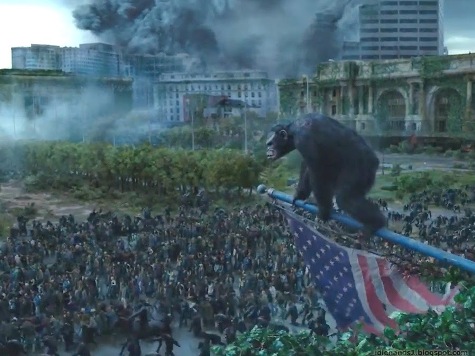Ten hard years have passed since the human-created Simian Flu was unleashed and ape-leader Caesar (Andy Serkis) led his followers deep into the Redwood Forest behind San Francisco. Well, hard years for humans. Less than 1% survived the plague and now a group of survivors are doing their best to regain a sense of normalcy in a near-dystopian downtown San Francisco. This won’t be possible without electric power, which they will run out of in less than a month.
The apes, on the other hand, have flourished. Caesar, now a family man, is still their leader and, other than treehouses, they live a tribal life similar to that of the pre-Casino American Indian: The male apes hunt in packs, bring the meat back to their wives, school the children (rule #1: “Ape shall not kill ape.”), and ask only to be left alone to live life as they wish.

Two idyllic years without human contact are shattered when Malcolm (Jason Clarke) arrives. Representing the struggling San Francisco colony, and unaware a tribe of apes lives between him and his goal, Malcolm and a small team have come to fix a dam that will deliver the electricity their colony so desperately needs.
Can ape and human coexist?
In Rupert Wyatt’s “Rise of the Planet of the Apes” (2011), all the dramatic tension came from watching Caesar slowly pull away from his adopted human-scientist father Will (James Franco) to assume his place as a revolutionary.
Director Matt Reeves “Dawn of the Planet of the Apes” (in theatres now) reverses this idea. Caesar and Malcolm are peacemakers looking to form a bond of trust earned through acts of goodwill. The tension comes from how this is made impossible by those around them who, through stupidity, ignorance, or sheer hatred, won’t let it happen.
Whereas “Rise” was a highly political (but still very good) film that took a dim view of the human species as a whole, the pharmaceutical industry, greedy businessmen, and the competency of San Francisco law enforcement officers, “Dawn” is the exact opposite. The story chooses theme over politics and those themes will surprise fans of a series that has tended to skew left.

“Dawn” is nothing close to anti-human. As Dreyfus, the leader of the human colony, an under-used Gary Oldman is wisely eager to prepare for war after learning of the nearby ape colony, but only as a last resort. Moreover, despite the expected left-wing trope about “evil energy,” the human’s need for electricity is not only portrayed as necessary but as essential in ensuring mankind doesn’t devolve into something more primitive.
Without giving too much away, the story is much harsher on the apes and obviously wants to tell us that, regardless of species, once humanity arrives through self-awareness, we are all alike. “I always think ape better than human,” Caesar admits to Malcolm. “I see now how like them we are.” This is not only a moral message but it nicely balances out the polemic excesses of “Rise.”
“Dawn” also destroys two myths about the re-booted franchise. Back in 2011, the filmmakers themselves claimed that in “Rise” Caesar was based on Marxist revolutionary Che Guevara. This is proven as nonsense in the sequel.
Unlike Che, Caesar does not reveal himself a mad dog murderer and totalitarian after assuming power. On the contrary, he’s a wise and compassionate leader who governs with the consent of a governed who respect his wisdom. If anything, Caesar is the anti-Che; something much closer to George Washington.

There have also been reports that “Dawn” pushes gun control. There’s not a hint of this anywhere in the film. In fact, one of the film’s most iconic scenes involves an ape atop a galloping horse firing off two blazing machine guns.
“Dawn” is a more than worthy successor to “Rise,” and even a little better. On top of the tension created from your desire to see Caesar and Malcolm work things out, there’s an intense undercurrent as the inevitable becomes inevitable.
The performances, CGI, and action all deliver. Those of you concerned Reeves might bring along his obnoxious, godforsaken shaky-cam from the unwatchable “Cloverfield” can rest easy. Reeves not only shoots and stages the action scenes like a grown-up, a number of these sequences are knock outs.
I do, though, think the filmmakers made one big mistake. For some unforgivable reason, “Dawn” is shot in a 1.85 aspect ratio, when every single other “Apes” film, going back to the 1968 original, is shot in the wider and more cinematic 2.35: 1 ratio.
The look of the films, including the panoramic widescreen, was something that helped link them together. Write this off as a nerdy complaint if you like, but I attended a “Rise” and “Dawn” double feature last night and found the difference distracting and annoying.
Moreover, it’s an unnecessary violation of a 46- year tradition.
Follow John Nolte on Twitter @NolteNC

COMMENTS
Please let us know if you're having issues with commenting.